Arnon Grunberg's Blog, page 12
June 19, 2025
Situation
 Fly
FlyOn wait-and-see – Zvi Bar'el in Haaretz:
‘Scanning through detailed New York Times reports on Trump's decision-making process – and the internal disputes among White House officials, influencers and media personalities close to his ears and heart – gives the impression that Trump has become embroiled in a war he didn't intend to start, dragged in by Israel's initiative.
He appears to be waiting to see how events unfold, instructing his people and forming policy on the fly as the situation develops. So far, there is no indication that the administration is moving toward presenting a consensual and well-formed plan, both regarding the demands to be made of Iran and about the day after the war ends.
Israel may conclude from this that it can continue to dictate the pace of the war and define its objectives, just like it has done in Gaza, where Trump also adopted a wait-and-see approach. Whenever he did exert pressure or demand changes, these related to tactical moves – such as allowing humanitarian aid into the Gaza Strip – rather than ending the war.’
Read the article here.
MAGA is wait-and-see, and some (nasty) spectacle at home? Apparently it is.
Authoritarianism can also be wait-and-see.
A war can start as wait-and-see, or drag on as wait-and-see?
Waiting for Trump to tell Israel: stop.
Job
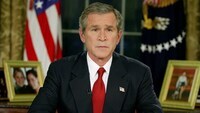 Edge
EdgeOn another quagmire - Elisabeth Bumiller in NYT:
‘A little more than 22 years ago, Washington was on edge as a president stood on the precipice of ordering an invasion of Baghdad. The expectation was that it would be a quick, triumphant “mission accomplished.”By the time the United States withdrew nearly nine years and more than 4,000 American and 100,000 Iraqi deaths later, the war had become a historic lesson of miscalculation and unintended consequences.’
(…)
‘“You’ve got to go to war with the president you have,” said William Kristol, a Never Trumper and editor at large of The Bulwark who was a prominent advocate of war with Iraq. “If you really think that Iran can’t have nuclear weapons, we have a chance to try to finish the job.”And once again the nation is waiting for a president to decide. “I may do it, I may not do it, nobody knows what I’m going to do,” Mr. Trump said Wednesday when asked about his thinking on striking Iranian nuclear facilities.’
(…)
‘John Bolton, a neoconservative who served as one of Mr. Trump’s first term national security advisers, was a big advocate for the war in Iraq, and is now a supporter of a U.S. attack on Iran.
“Bomb Fordo and be done with it,” he said on Wednesday. “I think this is long overdue.’’’
Read the article here.
Bolton: ‘Bomb Fordo and be done with it.’
Kristol: ‘You’ve got to go to war with the president you have.’
It’s 2003 all over again.
The good news is, no invasion this time.
The not so goods news is: there is no endgame.
But maybe, there is no endgame. Period.
To paraphrase Benjamin, just an intermission between two catastrophes.
June 17, 2025
Reliance
 Offensive
OffensiveOn all sorts of missions – Aluf Benn in Haaretz:
‘The opening of a campaign against Iran marks a new peak in Israel's reliance on the U.S. For the first time in its history, Israel is requesting that American military forces take part not only in defense, but in offensive action: the bombing of Iran's uranium enrichment facility in Fordow.’
(…)
‘Trump's hesitation stems from political risk, not military difficulty: Launching a war against a regional power that could disrupt global oil supplies and drag the U.S. into a third entanglement in the Middle East, following the long wars in Afghanistan and Iraq, both of which border Iran.’
(…)
‘The implicit message in Israel's public messaging is clear: President Franklin Roosevelt refused to bomb the railroad to Auschwitz in 1944. Trump now has the chance to level the "new Auschwitz" at Fordow. For years, Netanyahu has described Iran's nuclear program as a modern version of the Nazi death camps. In recent days, he has avoided such statements, but it's likely that the war plan devised by Netanyahu and IDF Chief of Staff Eyal Zamir is based on a "final step" that the U.S. must take, a bombing raid with a massive payload, that would destroy the nuclear facility buried deep underground. If Fordow remains intact, Iran could rehabilitate its nuclear project much more quickly.’
(…)
‘That principle has now been broken. A new precedent has been set: For the first time, Israel is asking for American pilots to fly alongside the crews of Israeli Air Force Commander Tomer Bar. Even if Fordow is ultimately not bombed – whether Iran dismantles it on its own or the IDF finds another way to damage it – the taboo of requesting direct military involvement has been broken. The request that America bomb Fordow is a clear indication: Some missions are simply too big for the IDF alone.’
Read the article here.
Too big, the question is, what missions are really necessary?
If Auschwitz is invoked to bomb Fordow we can safely say that remembrance culture as we know it a matter of the past. Remembrance culture already dying. This will be the nail in the coffin.
What will be gained is unclear? Maybe nothing.
A pariah state can survive for quite a while but its future is bleak.
June 16, 2025
Resolve
 Leaders
LeadersOn Iran – Matina Stevis-GridneffZolan Kanno-Youngs and Michael D. Shear in NYT:
‘President Trump has decided not to sign onto a statement calling for de-escalation between Iran and Israel that is being prepared by the Group of 7 industrialized nations, according to a White House official, the first evidence of an ongoing rift between Mr. Trump and his fellow leaders gathered for a summit in Alberta, Canada.’
(…)
‘The draft G7 statement is being prepared for the leaders of the group’s member nations — besides the United States and Canada, they are Britain, France, Germany, Italy, Britain and Japan — along with the leaders of the European Union. It acknowledges the need to prevent Iran from acquiring a nuclear weapon and explicitly supports Israel’s right to defend itself.
But it also calls on both sides to de-escalate in order to resolve the issue of Iran’s nuclear ambitions at the negotiating table, saying that diplomacy is the best way to resolve the dispute.’
(…)
‘On Sunday, Mr. Trump told ABC News that he was “open” to the idea of President Vladimir V. Putin of Russia mediating the conflict between Israel and Iran.’
(…)
‘Israel widened its targets on Monday, striking and setting fire to the headquarters of state television while anchors were broadcasting live. Iran has been retaliating, sending missiles and drones headed toward Israel on Monday.
But Mr. Trump said that he believed the fighting would end soon.
“I think Iran basically is at the negotiating table,” he told reporters at the summit. “They want to make a deal."’
Read the article here.
Basically at the negotiating table? Die first, negotiate later.
And Putin as negotiator? Delightful.
Wanted by the International Criminal Court but in the meantime getting ready to broker a honest peace in a difficult region.
Maybe Trump is willing to share the Nobel Peace Prize with Putin?
I say: whatever works.
June 15, 2025
Conclusions
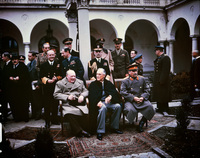 Door
DoorOn how to win a war and what not to mention – Omer Bartov in TLS:
‘There is a fair amount of talk these days about the crumbling of the international order put into place in the wake of the Second World War. Russia’s invasion of Ukraine, the outcome of which is yet to be determined, is one obvious indication. Vladimir Putin seems set on crowning his tenure as the Russian Federation’s long-term strongman by expanding his realm back to the very same territories that Imperial Russia and Joseph Stalin’s Soviet Union took over with fire and sword. If defeat in the First World War, revolution and civil war stripped the newly emergent Soviet Russia of its western lands, Stalin won them back, and then some, in the Great Patriotic War, until Mikhail Gorbachev’s dismantling of the Soviet state brought the EU and Nato to Russia’s door, precisely what Stalin was determined to prevent and what Putin is committed to reversing. Another site of disintegration of the international order is the Middle East, especially Israel/Palestine. Territorially, the region is the outcome of the dismantling of the Ottoman Empire in the First World War, while the establishment of an international legal regime, also threatened by the actions of both sides in the conflict, was established in response to the crimes of the Nazis.
The authors of the two exceedingly well-written and wide-ranging books reviewed here do not discuss these current crises, but both prompt the question, how did we get from there to here? Some of the answers may be inferred from their exploration of the manner in which the bloodiest war in human history was won by the democracies in alliance with the Soviet Union. Phillips Payson O’Brien’s The Strategists makes two fundamental claims. First, he argues that the strategic vision of the principal leaders of the Second World War – Winston Churchill, Stalin, Franklin Delano Roose¬velt, Benito Mussolini and Adolf Hitler – was forged by their experiences as young participants in colonial wars, revolution and the First World War. Those who drew the right conclusions from those earlier military confrontations, he suggests, reaped their benefits in the mighty struggle over which they presided as the leaders of millions of combatants. This brings O’Brien to his second argument, which he first presented in his study How the War Was Won: Air-sea power and Allied victory in World War II (2015), contending that it was thanks to Britain and the US’s superiority in the air and on the sea, in what he terms the “air-sea super battlefield”, rather than the strength of their land armies of infantry, artillery and armour, that the Allies won the war against Nazi Germany, fascist Italy and Imperial Japan.’
(…)
‘As Tim Bouverie reminds us in Allies at War, no less than 75 per cent of the Wehrmacht’s losses were incurred on the Eastern Front, fighting a vast land war against the Red Army. As Bouverie also notes – a point O’Brien makes as well – the western Allies, and especially Churchill (who had opposed the slaughter of British troops in futile offensives in 1916 and 1917), delayed opening a second front in France until late in the war, despite promises made to Stalin about a landing as early as 1942. As Churchill saw it, the Wehrmacht had to take a brutal beating from the Red Army before such a landing could be accomplished without the kind of bloodshed seen on the Somme. This meant that by the time the Allies began fighting in France, Stalin was already well on his way to swallowing most of eastern Europe, which he had no intention of releasing from his grasp.’
(…)
‘That was the root of the Cold War, which lasted for more than four decades. The collapse of Communism undid these proxy states and removed eastern Europe from Russia’s grasp. It would appear that Putin is picking up where Stalin left off, eager to re-establish the same chain, whose origins date back to imperial times. As we observe the great unravelling of the international order, which was meant to prevent powerful states from taking over their neighbours in the name of their own national security, and was grounded in conventions and treaties geared to protect individuals and groups from war crimes, extermination and genocide, we can only hope for a new generation of leaders who will pull us back from the abyss.’
Read the article here.
How to win a war is one thing, but what are the moral grounds for winning? The cynical point of view: win first, morality will come afterwards.
Perhaps.
Bartov hopes for learders who will pull us back from the abyss.
What abyss? The total war between Iran and Israel.
World War III?Oligarchy forever in the US?
And where are the leaders? Perhaps I’m just impatient.
June 14, 2025
Meaningless
 Nothing
NothingOn endorsing attacks retrospectively – The Economist:
‘The success of the initial attacks led Mr Trump to endorse them fully retrospectively. “I think it’s been excellent. We gave them a chance and they didn’t take it,” he told one interviewer. “I always knew the date,” he boasted to another.’
(…)
‘Mr Trump clearly holds out hope for diplomacy, posting on social media, “Iran must make a deal, before there is nothing left, and save what was once known as the Iranian Empire”. But the lines of communication with Iran may now be closing. According to reports on June 14th an Iranian official dismissed the us-Iran negotiations as “meaningless”.’
(…)
‘Israel may be calculating that America can be persuaded to join the campaign with its heavy bombers, which carry the 30,000lb bombs capable of burrowing deeper, rather than leave the job half-done.
America could also be pulled in by Iranian retaliation. Iran’s limited ability to strike at Israel may force it to consider other options. It could hit American targets in the region, hoping to spook Mr Trump. It could use its proxies to attack shipping in the Red Sea (as the Houthis have been doing), or it could close the Strait of Hormuz and attack energy facilities in the Gulf (raising oil prices). And if the Iranian regime is brought down by Israel’s efforts—an ambition that Mr Netanyahu raised explicitly on June 13th, saying that the strikes were “clearing the path” for its overthrow— the president may not be able to escape the resulting chaos, which could easily threaten America’s interests or its allies in the region.’
(…)
‘The dilemma for the ever-ambivalent Mr Trump is acute: if he chooses to go “all in” in helping Israel destroy Iran’s nuclear facilities, he could shorten the conflict. Yet by doing so he could also escalate it and expose America to another forever war.’
Read the article here.
Mr. Trump won’t go all in, unless he has no other choice.
The chaos is already, I think it’s unlikely that Israeli attacks will topple the regime in Iran, quite the opposite.
The question is: will the US believe that an regional war is bearable or not?
And what will China do?
Eating up Taiwan while nobody is looking?
June 13, 2025
Necessary
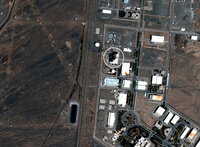 Remember
RememberOn leverage - Zvi Bar'el in Haaretz:
‘While Trump may view the Israeli strike as useful leverage to bring Iran back to negotiations, Israel's position is fundamentally different: it holds that no agreement with Iran is worth signing and that a new reality must be created – one in which no agreement is necessary because Iran no longer has a nuclear program at all.
This vision is tempting to believe in, but it's important to remember that Israel has learned the hard way how misleading terms like "total victory" and "infrastructure collapse" can be, even when used in conflicts with far weaker actors than Iran.
Israel also cannot ignore the broader Arab and international context. Saudi Arabia, the United Arab Emirates, and Qatar – the three major financial powers that have pledged to invest trillions in the U.S. economy – have strongly opposed any Israeli, American, or joint strike on Iran. On Friday morning, Saudi Arabia condemned the attack and called for an emergency meeting of the UN Security Council to stop it.’
(…)
‘Militarily, Iran's response has so far been limited to drone attacks on Israel. It has avoided using its Shiite militias in Iraq or Hezbollah in Lebanon to strike American or Arab targets – perhaps signaling a desire to keep the confrontation bilateral between Iran and Israel, rather than regional or involving the U.S. However, this posture could change if the Israeli attacks escalate or begin to threaten the regime's internal stability, not just its nuclear and missile infrastructure.
Israel, too, appears to be self-limiting – or being restrained by Trump – to actions that do not draw the U.S. into direct military involvement. Targeting nuclear and ballistic facilities while avoiding critical civilian infrastructure defines the current boundaries of "legitimate" warfare, and may be designed to avoid sparking popular unrest inside Iran.
The surgical elimination of military figures – and not senior civilian officials – is meant to signal that this is not a war against the Iranian people or the regime itself, but rather a campaign against those responsible for the country's military and strategic threat.
With the war in Gaza still ongoing, Israel and the U.S. will need to decide not only when the "gates of hell" were opened, but also when and how to close them. If not all nuclear sites are destroyed, a decision will have to be made about what counts as a "game-changing" success.
On this, Israel and Washington may be headed for a clash: Trump may view a renewed nuclear deal as a major achievement resulting from the strike. In contrast, Israel may see any such agreement as a failure, particularly if Iran is still able to pursue nuclear capabilities, even if enrichment is restricted.’
Read the article here.
Total victory? For Mr. Trump. In this scenario he is edging closer to the Nobel peace prize.
The question what else will be achieved with the attack against Iran remains to be seen.
This is what Amos Harel has to say about it:
‘Not only is Benjamin Netanyahu in a position of enormous power as the head of a brown-nosing cabinet that lacks any substance, ability or talents. Israel's defense establishment has also been weakened, and its leaders rarely express an independent opinion diverging from Netanyahu's views. Even more worrying is the fact that Netanyahu's personal considerations are far from being pure. He is in the midst of a political war for survival in which all means (and mistakes) are justified, as far as he is concerned, to preserve his rule. His actions and statements over the past two-and-a-half years have proven that this man no longer has any red lines. Instead, he consistently works to undermine Israeli democracy and harm the rule of law.’ Read the article here
A war, because king Bibi felt like. His whims are law.
June 12, 2025
Alone
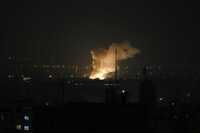 Different
DifferentOn successes – Isabel Kershner in NYT:
‘Israel’s military chief of staff, Lt. Gen. Eyal Zamir, warned in a televised address that Iran’s response was likely to be different than previous counterattacks, adding, “I don’t promise successes alone.”’
Read the article here.
‘I don’t promise successes alone.’
We are edging closer to a regional war. Not only successes.
A few failures as well.
As is common in war.
Emotional
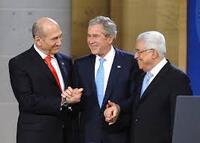 Rockets
RocketsOn nonsense and ridicule – Ezra Klein talking to Ehud Olmert in NYT:
‘I’ve said that the strategy of Ben-Gvir and Smotrich is not just fighting Hamas in order to try and eradicate the military power as a result of what they accomplished, which was terrible. This is far broader. After 20 months of fighting, after eliminating almost all of their leadership — Yahya Sinwar, Muhammad Deif, Muhammad Sinwar, Ismail Haniyeh — and all the commanders — high-level and medium-level and low-level commanders — all were eliminated. The launchers were destroyed. The rockets were destroyed. The command positions were destroyed. So to say that Gaza now poses a security for the existence of the state of Israel is nonsense. The only possible interpretation is the one you offer: They want to get rid of all the Gazans, and this is only part of the strategy.’
(…)
‘Hundreds of ballistic missiles with 1,000-kilo warheads were shot at Israel, and 95 percent of them were intercepted, with the assistance of America and Great Britain and France but largely because of us. So to say that there is an imminent danger to the very existence of Israel from a few thousand terrorists is ridiculous.’
(…)
‘I believe the majority is on my side — on the side of those who understand that we have to compromise because there is no alternative for compromise but endless war and endless fighting and endless bloodshed and endless killing and endless losing of our children and no horizon for the future. This is the deeper confrontation we have now in our society. And this is, in a way, as I called it — it is a war on the soul of Israel.’
(…)
‘I have a partner from the Palestinian side, a former foreign minister of the Palestinian Authority, Dr. Nasser al-Qudwa, U.N. ambassador and the nephew of Arafat. We are campaigning together. We issued a joint statement about two states and so on. And we met many of the leaders of Europe, almost all of the foreign ministers in Europe. And President Macron has been a traditional friend of Israel. The French Army took part in the defense of the state of Israel just a few months ago when the Iranians were attacking us with ballistic missiles. So are the British. To say that they are antisemites or that they are now collaborating with terror is obnoxious. It’s outrageous.’
(…)
‘So yes, look, it’s very hard for the Israelis to overcome, in generations, the obsession of being the victims of hatred. We so much fell in love with the status of being the underdog, the victim of hatred, of antisemitism, of discrimination, of segregation, of whatever — that we fall into this in every possible occasion that we have. And it’s so easy for so many among us to say: OK, what do they want from us? Don’t we have a right to defend ourselves after what they did on the 7th of October? So now we are defending ourselves. But when we defend ourselves, they hate us. and they attack us, and they riot against us and whatnot.’
(…)
‘I’ll tell you what: I think the opposite. I believe that a Palestinian state will be the best partner to the state of Israel, out of all the Arab countries. They are smart, they are capable, they are dynamic, and they are ambitious. We know them, and they know us. They know us better than the Egyptians, better than Jordanians, better than the Emiratis or the Saudis. They know us because they live with us.
But of course, it will become possible only if the agreement will be an expression of an open mind and open heart and good will on both sides, rather than something that comes with force and with violence and with humiliation and with deprivation of rights.
When I started to negotiate with Abu Mazen 18 years ago, at the beginning I made every possible effort to make him feel that we are equals. I always thought that building a personal human, emotional rapport is enormously important if you want to negotiate with someone and you want to win him, and if you want to convince him that you mean well, you have to mean well.’
Read the article here.
‘We so much fell in love with the status of being the underdog, the victim of hatred.’
Yes, absolutely.
There are many other people who fell in love with this. But that’s not an excuse.
Eva Illouz, calls this the poison of victim culture.
Fait enough that the time Olmert spent in prison has not been mentioned.
No mentioning also of Israel attacking Iran. Is the attack upcoming or not? An Iran-Israel war will push Gaza to the side with all dire consequences for the Palestinians living there.
June 11, 2025
Vision
 Realization
RealizationOn overseas flights – Aluf Benn in Haaretz:
‘In 1970, Soviet dissident Andrei Amalrik was a young historian at Moscow State University when he published his provocative book, "Will the Soviet Union Survive Until 1984?"
His prophecy seemed utopian and exaggerated, but Amalrik accurately foresaw the process that would lead to the fall of the Red Empire, and his timing, which he chose as a tribute to George Orwell, was only seven years off. He did not live to see the realization of his vision: after being imprisoned in the Gulag and exiled from his country, he was killed in a car accident in Spain.’
(…)
‘After 20 months of war, Israel shows resilience and prosperity. The shekel is stable, unemployment is low, and the beaches and restaurants in Tel Aviv are full. The killing and starvation in Gaza occur in the "foreign media" and don't sully the Israeli mainstream, which mostly complains about the high cost of overseas flights.’
(…)
‘The first clause in that vision must be ending the war, before Gaza swallows Israel into itself, never to return. Just as Amalrik warned the rulers of the Soviet empire, who did not want to listen.’
Read the article here.
Rulers don’t listen. That’s the old news.
The big difference with the Soviet-Union is that the sense of Messianism, that was part of real existing socialism, secular Messianism is also Messianism, but still was in 1970 non-existing anymore.
Messianism in Israel is very much alive. Self-destruction is possible, but a slightly fascist theocracy is another possibility. And the theocrats can survive for quite a long time.
Arnon Grunberg's Blog
- Arnon Grunberg's profile
- 415 followers



